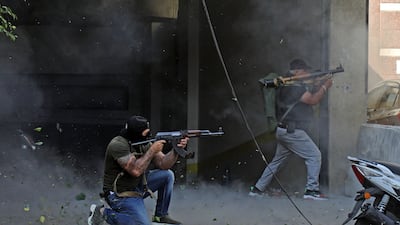Unlike so many other tragedies in Lebanon’s history, there was nothing sectarian about the Beirut blast. The havoc wreaked by the explosion of poorly stored ammonium nitrate at Lebanon’s largest port in August of last year touched every community in the city in some way. It took out much of the city centre, causing $15 billion worth of damage, killing more than 200 people, injuring 7,000 others and leaving 300,000 homeless.
In the aftermath of such a calamity, the pursuit of justice – for individual victims and for society as a whole – is paramount, but no easy task. For Judge Tarek Bitar, the lead investigator of an inquiry into the blast’s causes, justice is proving more difficult than necessary to attain, as the investigator faces repeated calls for his dismissal and a growing threat of violence.
Since his appointment in February, Mr Bitar has faced an avalanche of political pressure from sectarian groups in Lebanon – foremost among them the militant political party Hezbollah – who accuse him of politicising the case.
“You are picking certain officials and certain people,” Hassan Nasrallah, Hezbollah’s leader, said to Mr Bitar in a televised address on Monday. As any investigator knows, however, criminal responsibility usually lies with “certain people”.
Those “certain people”, Mr Bitar says, may include the powerful individuals who are actually politicising his case. On Tuesday, Mr Bitar’s investigation was suspended after Ali Hassan Khalil – an MP, former finance minister and Hezbollah ally – and two other former ministers made complaints to Lebanon’s Supreme Court about his conduct. All of them have been charged by Mr Bitar with criminal negligence related to the blast. They have claimed Mr Bitar’s charges are a violation of an immunity clause for MPs written into the country’s constitution. Another former minister, Youssef Finianos, filed a separate complaint accusing Mr Bitar of bias, calling for him to be replaced.

Mr Bitar’s predecessor, Fadi Sawwan, was removed from his position as investigating judge earlier this year after similar complaints. Mr Sawwan had also charged multiple officials, including then caretaker prime minister Hassan Diab, and tried to cite case law that would overrule parliamentary immunity in certain circumstances.
In any case, Mr Bitar does not have to rely on that argument, as legal immunity for all MPs is now suspended until October 19, when Parliament goes back in session. In light of this, there are no legitimate grounds for the ministers’ complaints. Rather, legal experts in Lebanon suspect that they are intended to exploit Article 125 of the country’s Code of Civil Procedure, which automatically suspends a judge’s work when a lawsuit is filed against them. Burying Mr Bitar in lawsuits could prevent him from taking advantage of the tight window he has in which to prosecute politicians.
Fears that the fraught legal process would give way to extrajudicial violence have grown in recent weeks. It does not help matters that Lebanon’s security forces do not have an effective monopoly on the use of force; Hezbollah and other militant groups maintain a considerable arsenal of weapons, posing a constant domestic threat to police and the Lebanese Armed Forces. In September, Wafiq Safa, a senior Hezbollah official, allegedly threatened Mr Bitar through an intermediary, reportedly stating: “We have had it up to our noses with you. We will stay with you until the end of this legal path, but if that doesn’t work, we will remove you by force.”
On Thursday morning, the Supreme Court threw out the cases against Mr Bitar, allowing the investigation to resume and bringing the end of his opponents’ legal path closer. Shortly afterwards, violent protests broke out among supporters of Hezbollah and its allied party Amal, near Beirut’s Palace of Justice. At least six people were shot dead and dozens were wounded.
The environment surrounding Mr Bitar’s investigation is growing increasingly dangerous. It will take all of his determination, strong support from those who wish to see Lebanon made whole again and a greater respect for Lebanese state institutions in order for the pursuit of justice to continue.


